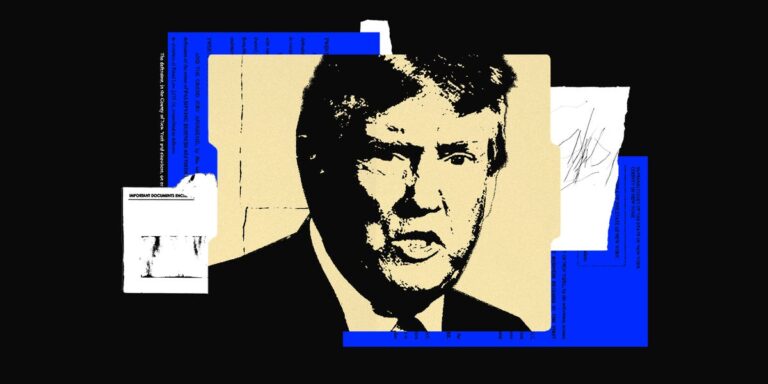- A criminal case against Donald Trump for possessing classified documents has been dismissed.
- The judge ruled that the appointment of Jack Smith as special prosecutor was unconstitutional.
- The ruling will almost certainly be appealed and could reach the Supreme Court.
The federal judge overseeing former President Trump’s criminal case for hiding classified documents at Mar-a-Lago has dismissed the charges against him.
U.S. District Judge Eileen Cannon, who was appointed by Trump during his presidency, ruled on Monday that the appointment of Special Counsel Jack Smith, who is overseeing the prosecution, was unconstitutional.
The case is widely seen as the simplest of Trump’s four criminal cases. Smith has alleged that Trump took classified government documents with him when he left the White House in January 2021, storing many of them at his Mar-a-Lago club.
Prosecutors allege that Trump then repeatedly obstructed federal agencies trying to retrieve the documents and directed employees to lie and mislead federal investigators, which led to a dramatic FBI raid at Mar-a-Lago in 2022.
Judge Cannon’s 93-page decision on Monday did not call into question any of those events. Rather, the Florida judge found that Smith’s appointment violated the Appointments Clause of the U.S. Constitution.
His special counsel role was created by Justice Department rules, but anyone with legal equivalent powers would need to be given authority by Congress, she wrote.
Cannon wrote that the only way to resolve this issue is to dismiss the charges against Trump.
“For more than 18 months, Special Counsel Smith’s investigation and prosecution have been funded by vast sums of money drawn from the Treasury Department without statutory authorization, making it nearly impossible to rewrite history at this point,” Cannon wrote.
Trump, who is recovering from injuries sustained after being shot in the ear by an assassin on Saturday, said on Truth Social that all four criminal cases against him should be dismissed, along with the sexual abuse and defamation claims made by E. Jean Carroll.
“As we move toward national unity after Saturday’s horrific events, the dropping of this lawless indictment in Florida should be just the first step, followed shortly thereafter by the dropping of the entire witch hunt,” he wrote.
The charges in Manhattan and Georgia were brought by local prosecutors, and even though a jury in a civil trial convicted Trump of sexually abusing and defaming Carroll, Trump has argued without evidence that the cases were orchestrated by the Justice Department and were political in nature.
Cannon’s ruling Monday will almost certainly be appealed to the 11th Circuit Court of Appeals and then could be taken up by the U.S. Supreme Court.
The legality of special counsels at the Department of Justice has been a topic of debate for the past two decades. The laws that provided for so-called independent counsels during the Iran-Contra scandal under President Ronald Reagan and the Whitewater controversy under President Bill Clinton expired in 1999. Since then, US attorneys general have relied on the Department of Justice’s internal rules to appoint special counsels with limited powers.
The lawyers for the special counsel’s investigation have repeatedly argued that the appointment of these new special counsels is unconstitutional. Because the special counsel can convene grand juries and indict cases in any district of the country, they argue, he or she is effectively an “officer of the United States” under the Appointments Clause of the Constitution and must be funded and empowered by Congress. The Department of Justice argues that the arrangement is permissible because the special counsel is appointed and overseen by the Attorney General, who has that authority.
In his ruling, Judge Cannon slammed the executive branch as a whole, writing that federal agencies generally should be cautious about appointing special counsels based on their own internal rules.
“After all, the administration’s increasing familiarity with appointing ‘regulatory’ special counsels in recent years appears to have followed a haphazard pattern with little judicial scrutiny,” she wrote.
When the Supreme Court heard arguments on presidential immunity earlier this year, some legal groups and allies of President Trump urged the court to also consider a special counsel.
While the Supreme Court ultimately did not hear arguments on the issue (though it did uphold broad presidential immunity in criminal cases), Chief Justice Clarence Thomas wrote a concurring opinion finding that many types of special counsels are unconstitutional.
None of the other eight justices signed on to Justice Thomas’ opinion, and lower courts have consistently upheld the lawfulness of special counsel Robert Mueller and others in cases involving the president.
Cannon’s decision could be good news for Hunter Biden, who was convicted last month of gun-related crimes in a trial brought by special counsel David Weiss. Biden’s legal team has indicated that in an appeal, they plan to challenge the lawfulness of appointing the special counsel in the first place.
This is breaking news and will be updated.

